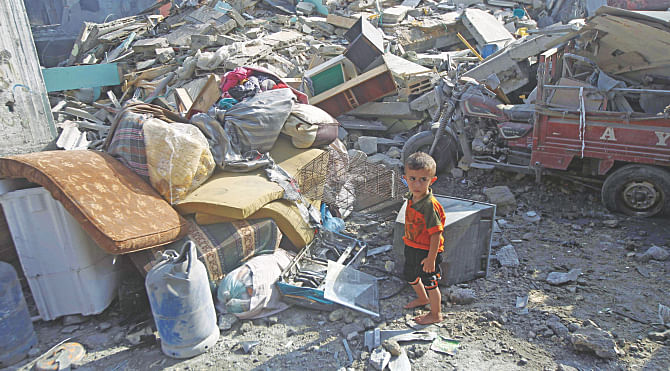296 children killed so far
296 children killed so far
Air strikes, tank fire on; Israel 'close to completing' anti-tunnel operation; death toll 1,667

At least 296 Palestinian children and adolescents have been killed since Israel launched its offensive in the Gaza Strip, the UN said yesterday as fighting escalated after a humanitarian ceasefire collapsed to end the violence.
"Children make up for 30 percent of the civilian casualties," said the UN children's agency UNICEF, adding that the toll was based on deaths which it was able to verify and was likely to rise.
The toll breaks down to 187 boys and 109 girls, with at least 203 of them under the age of 12.
Meanwhile, air strikes and tank fire continued pounding huge areas of southern Gaza into rubble, killing scores more people, as militants kept up their cross-border fire, with 56 rockets hitting Israel and another six downed, including two over greater Tel Aviv.
Since midnight (2100 GMT), more than 86 people have been killed, the vast majority in Rafah, raising the overall toll to 1,676, emergency services spokesman Ashraf al-Qudra said, putting the number of wounded at more than 9,000.
UN figures indicate at least two thirds of the dead are civilians, with around one third women and children.
Amid raging violence, the Israeli army yesterday gave a first indication it was ending operations in parts of Gaza, while continuing to bombard other areas ahead of fresh truce talks in Cairo.
As a Palestinian delegation flew to Egypt in search of a ceasefire, the Israeli army messaged residents of part of northern Gaza that it was "safe" to return home.
"They have been informed it is safe for civilians to return to Beit Lahiya and Al-Atatra," a spokeswoman told AFP, in what was understood to be a confirmation that troops had stopped operating there.
Witnesses in the north confirmed seeing troops leaving the area as others were seen leaving another flashpoint area in southern Gaza.
It was the first time troops had been seen pulling back since the start of Israel's devastating 26-day operation, which has so far claimed more than 1,660 Palestinian lives and displaced up to a quarter of the territory's population.
The move came after an army spokesman told AFP Israel was "quite close to completing" the destruction of tunnels used for infiltrating southern Israel -- the main objective of the ground operation.
Despite the partial withdrawal, Israel's security cabinet decided against sending a delegation to ceasefire talks with the Palestinians in Cairo, media reports said.
With a 12-member Palestinian delegation due to arrive for truce talks in Cairo, Egypt's President Abdel Fattah al-Sisi said his country's truce proposal offered a "real chance to find a solution to the crisis" but that it must be implemented quickly to stop the bloodshed.
Chances of achieving a more permanent ceasefire nosedived on Friday after Israel said it believed Hamas militants had captured a 23-year-old soldier in a Friday morning ambush near the southern Gaza city of Rafah.
Immediately afterwards, Israel bombarded the Rafah area in shelling that is still ongoing, with medics saying it killed 114 people in 24 hours.
The alleged capture of Second Lieutenant Hadar Goldin drew sharp condemnation from the United Nations and the White House, which jointly brokered the abortive 72-hour truce and demanded his immediate release.
Hamas's armed wing, the Ezzedine al-Qassam Brigades, acknowledged its militants had staged an ambush early Friday in which soldiers were killed, but denied holding the soldier, saying the attackers were missing and presumed dead.
Israel considers the capture of its soldiers a casus belli, launching a 34-day war on the Lebanon's Hezbollah in 2006 after it seized two soldiers.
Around the same time, Gaza militants captured conscript Gilad Shalit and held him for five years before freeing him in exchange for more than 1,000 Palestinian prisoners.